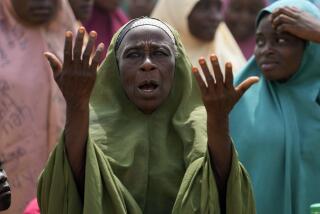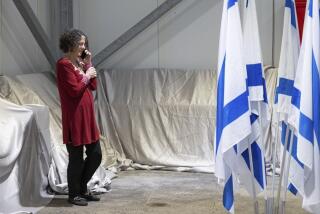Hours of Hymns, Prayers Ended in Shoot-Out, Death of 2 Bus Hostages : Pilgrims in Lesotho Certain ‘We Were Going to Die’
- Share via
MASERU, Lesotho — The nuns and children sang hymns and prayed for hours, and often their armed captors joined in. They drank rainwater from cups thrust out through the windows of the bus. And they waited, certain that “we were going to die,” as 21-year-old Vitalina Qhoasho put it Thursday.
“You had better dig their graves; we will finish them off tonight,” one the hijackers, whom the hostages remember as “the fat one,” had yelled Wednesday night to the 100 heavily armed Lesotho and South African policemen held helplessly at bay.
Two hours later, a 16-year-old schoolgirl and three hijackers were dead. A second hostage, a 55-year-old man, and the fourth hijacker died Thursday.
A dozen survivors interviewed Thursday described the tedious hours, the courageous acts of a few, the kindness and ruthlessness of their captors and the dramatic, bloody final minutes of the hostage-taking--a crime almost unheard of in black-ruled Africa.
30-Hour Standoff Ended
The beginning of the end came soon after dark Wednesday, in the 30th hour of the standoff between authorities in this remote mountain kingdom and the four rebels who had hijacked a bus with 71 Catholics making a pilgrimage to Maseru on the eve of Pope John Paul II’s visit.
The terrorists had rigged a homemade bomb in the bus, with a red light prominently displayed on the dashboard, apparently to ward off a police assault.
They had demanded, in a letter delivered by one of the hostages, to see the Pope, Lesotho’s King Moshoeshoe II, the British ambassador and various local politicians. In a response, delivered by a local priest, the authorities refused.
“They told us the answer . . . was not the ‘right answer,’ ” Vitalina Qhoasho recalled. “They said they would now have to kill us.”
But then, suddenly, the night and the bus were lit by huge police spotlights.
The hijackers panicked. The leader put a pistol to the head of the driver, an older man, and ordered him to “get out of the light,” and the bus lurched forward, crashing through the padlocked gate of the British High Commission, or embassy.
As the bus started rolling, the passengers, including 39 children and eight nuns, followed the lead of Sister Blanche Favreau, a French Canadian, and crawled under their seats for protection.
Within seconds, South Africa’s anti-terrorist unit, all young white men with their faces blackened, had killed three of the hijackers.
It all took about two minutes.
“I can still hear those bullets right here,” 16-year-old Lucy Raseipone said, pointing to her head. “If we had not been on the floor, we would have been killed.”
Judith Makhetha, a classmate of Lucy’s at John XXIII High School in Qacha’s Nek, was hiding under the third seat from the front.
She was killed, and a second hostage was mortally wounded, by a hand grenade that rolled under the seats. The grenade apparently fell to the floor and armed itself when one of the hijackers was shot to death by police marksmen. The South African Press Assn., quoting police sources, said the grenade caused most of the injuries.
It was Judith Makhetha who performed the most courageous deed of the ordeal, tossing a knife belonging to a hijacker out the window when none of the men was looking. After that, the hijackers ordered the hostages to search for the knife several times.
Sister Blanche, 63, thin and with silver hair, the only white person on the bus, climbed over the bodies of three of the hijackers to leave through the front door. Most of the other passengers scrambled out through the windows, leaped to the ground and began running.
The driver, wounded by a bullet in the temple, was slumped in his seat, barely conscious. He was begging other passengers for a knife “to finish himself off because he thought he was going to die,” one survivor said. He was in critical condition Thursday.
Anastasia Matsepo Makhasane, a 48-year-old school teacher, was shot in the arm. After a doctor dug the bullet out, she said she was spared death because “I prayed to God and I had faith.”
The Pope met briefly with her and 20 other injured hostages Thursday. Rosary beads the Pope gave her were around her neck.
Were Told to Lie Flat
When the hostages ran from the bus into the darkness Wednesday, Vitalina Qhoasho remembered being surprised to find white men, speaking English. The South African officers, she said, told her and her classmates to lie flat on the ground because the fourth hijacker was still at large.
The fourth hijacker was found hiding among the passengers on the ground. His hands were bound and he was led away under his own power, survivors said. Radio Lesotho announced Thursday that the man had died, but gave no further details.
The hijackers had boarded the bus before it arrived at a church in Qacha’s Nek to pick up the pilgrims for the 250-mile journey to Maseru, the capital.
Police set up roadblocks to stop the bus after a service station attendant reported that the men on board had stopped for gasoline and left without paying for it. But the bus crashed through roadblocks and ended up in front of the British High Commission on a quiet road in a lush area of central Maseru.
The hostages passed the time in song and prayer. If they fell asleep, one of the hijackers would shake them awake. No one knew why.
Lunches that many of the passengers had packed disappeared quickly. The hijackers said the police refused to send more food. For hours there was no water, either, but eventually the police sent some.
The hijackers told the hostages they were from the Lesotho Liberation Army, a group seeking to overthrow the ruling military junta.
“We want peace in the country,” Sister Blanche recalled that one of the men said. “We prefer peace and we’ve never had it. But we’ll have it now.”
She added, “They were very kind to us, and they spoke to us kindly.”
The hijackers gave a tablet to a man who was vomiting and asked the authorities to send a doctor. They also released a disabled nurse.
“They were nice, but they said they would finish us off if the people they wanted to see were not here by nightfall,” Lucy Raseipone said.
More to Read
Sign up for Essential California
The most important California stories and recommendations in your inbox every morning.
You may occasionally receive promotional content from the Los Angeles Times.














